Settling into Cruising Life in Grenada, West Indies (WI)
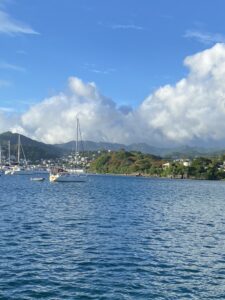
Mooring field at St. George’s.
Grenada is the # 1 destination in the Caribbean for Atlantic Storm Season. Grenada is below the traditional hurricane belt. That doesn’t mean storms don’t hit here, but historically very few hit here. Grenada gets the occasional tropical storm but seldom gets hurricanes. We hope that holds true this season! Our insurance company allows us to be here and covers us for damage sustained in a named storm; although, our “named storm deductible” is very high. If one looks at a Google Earth image of the southern bays of Grenada one will see hundreds of boats. Most insurance companies require a covered boat to be south of 12 Degrees North Latitude during storm season. Few storms track as far south as 12 Degrees North. Grenada’s southern bays are at 11 Degrees, 59 Minutes North Latitude; therefore, cruising boats congregate in the southern bays. Our insurance allows us to be as far north as 12 Degrees 40 Minutes North Latitude, which means we can move around as far north as the Tobago Cays, one of the filming locations for the original Pirates of The Caribbean movie.
We spent our first three days moored just off St. George’s, Grenada’s capital. We found a couple of good restaurants, a bakery, and a small grocery store. After a few days there, we refueled, and then headed the short distance, 12 nm, to the southern side of Grenada.
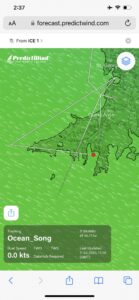
Track from St. George’s to Prickly Bay
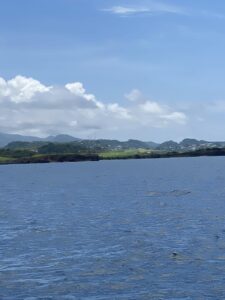
Rounding Point Saline on Grenada’s southern shore.
We’re now anchored in Prickly Bay, along with about 100 other sailboats. We’re starting to get acclimated to life on the hook. We’re always learning. During our first visit to one of the local chandleries (boating store), we walked up to the checkout with several items. The clerk asked us the name of our boat so she could look up our account. We told her we didn’t have an account. She informed us she’d need our boat documentation, cruising permit, and passports. We told her we didn’t have any of those things with us. So, we put everything back on the shelves. Later in the day we returned with all the requested paperwork. The reason for setting up an account is it allows you to purchase boat supplies without paying import duties – a big savings. Allowing boaters to purchase boat supplies duty-free is one of the reasons Grenada is considered very cruiser friendly.
Although we’ve spent lots of time at anchor in the past, our anchoring days were spaced out, not weeks at a time. Extended “life on the hook”, as boaters call it, will be a new experience. It’s nothing like life on land. To take the garbage out for example means not only bagging up the trash, but getting the dinghy in the water, finding a dock, getting ashore, and then finding a dumpster for the garbage. Going shopping takes many hours, no matter how limited the shopping list. Since we don’t have a car, we’re usually restricted to what we can carry and what might be allowed in a taxi or a bus. Even going to a nearby restaurant means taking a dinghy ride, finding a dock, and walking. We literally cannot just “run out” and get something or go do something. It’s not hard, it just means that an errand or excursion takes 4 or 5 times longer than doing the same errand or excursion back home on land. When it’s rainy, we are largely restricted to the boat unless we’re willing to get cold and wet. We are getting better at planning and organizing our excursions to shore, but it’s another anticipated learning experience. A standard topic of cruiser conversation is how to make trips to shore more efficient and less time consuming. We haven’t learned how to do it yet.
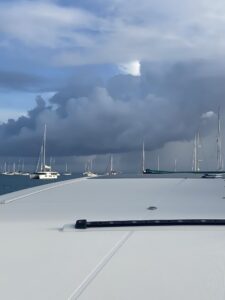
Passing storm cloud.
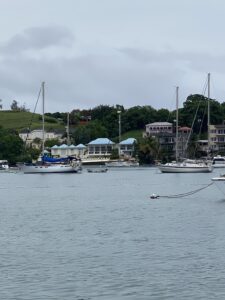
Boats on moorings can point in different directions when there is no wind.
This morning we had some strong winds with thunder, lightning and rain as a front passed through. Now there is no wind, and all the boats are bobbing around in the quiet. It’s really, quiet. We might try to go ashore later, but we’ll have to monitor the weather and ask ourselves: “is it worth getting the dinghy down?”, “are we willing to get cold and wet if the rain starts back?”, “how long will this errand take?”. Just another day on the hook in Grenada.
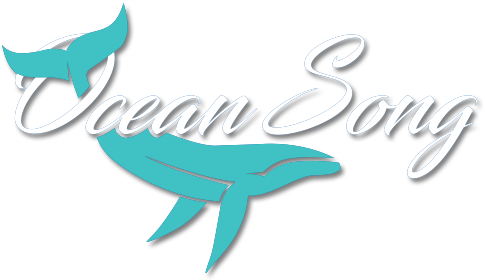
Leave a Reply